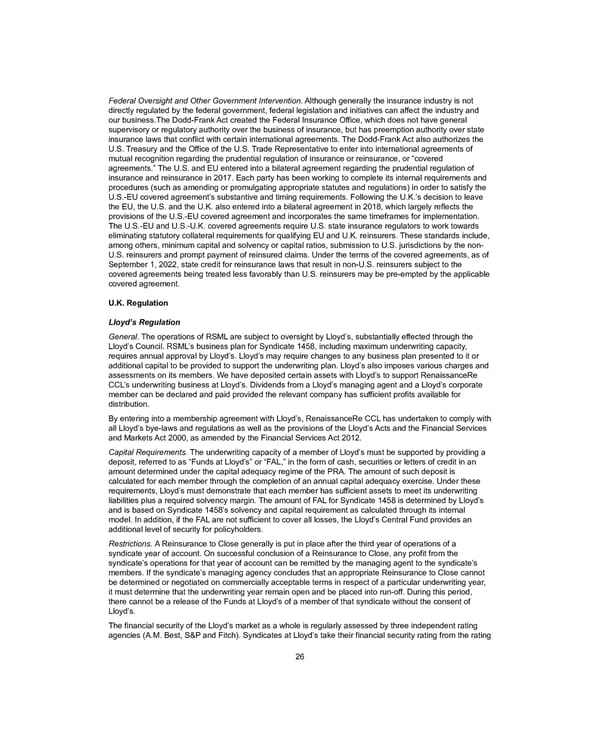Federal Oversight and Other Government Intervention . Although generally the insurance industry is not directly regulated by the federal government, federal legislation and initiatives can affect the industry and our business.The Dodd-Frank Act created the Federal Insurance Office, which does not have general supervisory or regulatory authority over the business of insurance, but has preemption authority over state insurance laws that conflict with certain international agreements. The Dodd-Frank Act also authorizes the U.S. Treasury and the Office of the U.S. Trade Representative to enter into international agreements of mutual recognition regarding the prudential regulation of insurance or reinsurance, or “covered agreements.” The U.S. and EU entered into a bilateral agreement regarding the prudential regulation of insurance and reinsurance in 2017. Each party has been working to complete its internal requirements and procedures (such as amending or promulgating appropriate statutes and regulations) in order to satisfy the U.S.-EU covered agreement’s substantive and timing requirements. Following the U.K.’s decision to leave the EU, the U.S. and the U.K. also entered into a bilateral agreement in 2018, which largely reflects the provisions of the U.S.-EU covered agreement and incorporates the same timeframes for implementation. The U.S.-EU and U.S.-U.K. covered agreements require U.S. state insurance regulators to work towards eliminating statutory collateral requirements for qualifying EU and U.K. reinsurers. These standards include, among others, minimum capital and solvency or capital ratios, submission to U.S. jurisdictions by the non- U.S. reinsurers and prompt payment of reinsured claims. Under the terms of the covered agreements, as of September 1, 2022, state credit for reinsurance laws that result in non-U.S. reinsurers subject to the covered agreements being treated less favorably than U.S. reinsurers may be pre-empted by the applicable covered agreement. U.K. Regulation Lloyd’s Regulation General . The operations of RSML are subject to oversight by Lloyd’s, substantially effected through the Lloyd’s Council. RSML’s business plan for Syndicate 1458, including maximum underwriting capacity, requires annual approval by Lloyd’s. Lloyd’s may require changes to any business plan presented to it or additional capital to be provided to support the underwriting plan. Lloyd’s also imposes various charges and assessments on its members. We have deposited certain assets with Lloyd’s to support RenaissanceRe CCL’s underwriting business at Lloyd’s. Dividends from a Lloyd’s managing agent and a Lloyd’s corporate member can be declared and paid provided the relevant company has sufficient profits available for distribution. By entering into a membership agreement with Lloyd’s, RenaissanceRe CCL has undertaken to comply with all Lloyd’s bye-laws and regulations as well as the provisions of the Lloyd’s Acts and the Financial Services and Markets Act 2000, as amended by the Financial Services Act 2012. Capital Requirements. The underwriting capacity of a member of Lloyd’s must be supported by providing a deposit, referred to as “Funds at Lloyd’s” or “FAL,” in the form of cash, securities or letters of credit in an amount determined under the capital adequacy regime of the PRA. The amount of such deposit is calculated for each member through the completion of an annual capital adequacy exercise. Under these requirements, Lloyd’s must demonstrate that each member has sufficient assets to meet its underwriting liabilities plus a required solvency margin. The amount of FAL for Syndicate 1458 is determined by Lloyd’s and is based on Syndicate 1458’s solvency and capital requirement as calculated through its internal model. In addition, if the FAL are not sufficient to cover all losses, the Lloyd’s Central Fund provides an additional level of security for policyholders. Restrictions. A Reinsurance to Close generally is put in place after the third year of operations of a syndicate year of account. On successful conclusion of a Reinsurance to Close, any profit from the syndicate’s operations for that year of account can be remitted by the managing agent to the syndicate’s members. If the syndicate’s managing agency concludes that an appropriate Reinsurance to Close cannot be determined or negotiated on commercially acceptable terms in respect of a particular underwriting year, it must determine that the underwriting year remain open and be placed into run-off. During this period, there cannot be a release of the Funds at Lloyd’s of a member of that syndicate without the consent of Lloyd’s. The financial security of the Lloyd’s market as a whole is regularly assessed by three independent rating agencies (A.M. Best, S&P and Fitch). Syndicates at Lloyd’s take their financial security rating from the rating 26
 2021 Annual Report Page 41 Page 43
2021 Annual Report Page 41 Page 43